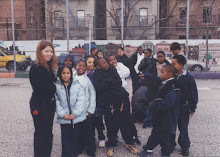background: This was written for a newsletter published by the Writing Center at Columbia College when I was working there. Sarah Willis was an undergrad student and tutor at the time. Joanne Siwiec--was a student I tutored.
......................................
Writer’s Diary
Art is about breaking free from some old idea or way of doing things, isn’t it? Isn’t it about pushing your thoughts through some invisible boundary line that says “logical” and moving out toward a place we question? Joanne Siwiec does this when she thumbs through felts and mohairs and synthetics for the right touch; Sarah Willis does the same when she uses a hack saw to shape delicate cubes of alabaster, recreating the sweet illusions of sugar. These expressions release an urgency existing within us, prodding us to create or learn more about the complex layering of sound engineering, television production, or computer animation.
Stories are being told everyday, all around us. We tell them in the way we shape our conversations, a beginning, the punch line (or punch in the face), and the end. And we can hear stories as we let our eyes float on a painting, coming to our own understanding through the reactions we experience.
All of this to say, we are here because we care about ideas and we have something to say to each other. The Writing Center, I have found, is a place to start those conversations. I have tutored here for two semesters now, along with teaching three different courses along the way. But I don’t really like the term, “tutor,” or “consultant” for that matter. For me The Writing Center is an extension of the classroom, cranked up a few degrees because it’s your time to talk about your work and your ideas for an hour. I see it as a debate, or an equal exchange, in the way that two people generate more creative thought than one person on his or her own. Exchange is the important word, and it takes us right back to the beginning of this page, because through exchanges, the sharing of ideas, we enable ourselves to push through those invisible boundaries that keep us right where we are, when we know all along that where we really want to go is to a place of new understanding, again and again and again.
.......................................
"The explanation is to be found in a further fact: to be learning something is the greatest of pleasures not only to the philosopher but also to the rest of mankind, however small their capacity for it . . . "
Aristotle from Poetics
.......................................
"He knows how to make the invisible visible."
Wynton Marsalais on Louis Armstrong
(2001)
Subscribe to:
Post Comments (Atom)








No comments:
Post a Comment